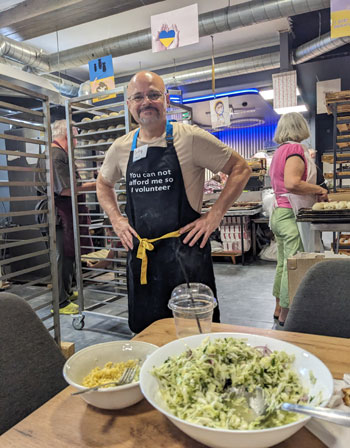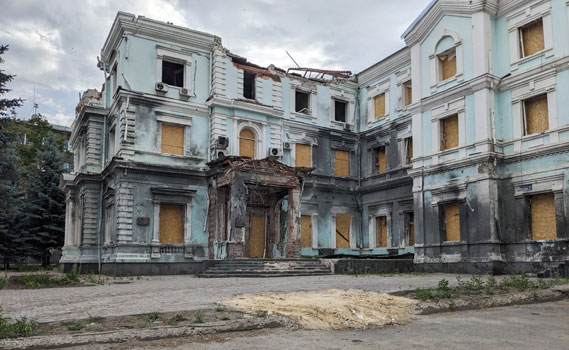June 16, 2024, Kharkiv, Ukraine.
Imagine your town received an official warning that a missile was about to strike in the vicinity – exactly where or when, no one could say. You might run or you might hide, but you would probably not ignore the warning.
That is because you do not live in Kharkiv [HAR-keev]. This city once had the second-largest population in Ukraine at 1.3 million. In February 2022, at the start of Putin's “special military operation,” Russian forces reached the outskirts of the city, but were thrust back to the border, only nineteen miles away, the next month. Since then, the Russians have pushed to within fifteen miles of Kharkiv, but seem unable to make further headway against concentric Ukrainian fortifications. They continue to bombard the city and surrounding villages with missiles and glide bombs. One result of the war is that, through casualties, emigration, and conscription of men aged 25 to 60, the population of the city has fallen to about 800,000 people. This demographic loss has had serious economic repercussions for the city. Many small businesses have closed. It was not unusual for me to find a promising restaurant or café on my phone map, only to arrive and find the place closed and empty with no explanation on the door.

I have been in Ukraine for just over two weeks, volunteering with charity organizations doing everything from rebuilding homes to feeding refugees. I spent one of those weeks in Kharkiv, working with an outstanding outfit called Hell’s Kitchen, which provides for those suffering food insecurity – the elderly, disabled, orphaned, or IDPs (Internally Displaced People; that is, refugees from other parts of Ukraine). This one kitchen with some fifty volunteers feeds between a thousand and thirteen hundred people a day. It does not shut down when Russian missiles target the city. People need to eat.
The missiles usually strike either Ukrainian military positions east and northeast of Kharkiv, or the small villages outside the city. But sometimes the Russians target the residential or commercial centers of the city, with the only possible objective of killing civilians. The week before I arrived in Kharkiv, two Russian glide bombs hit the Epicentr big-box hardware store, killing twenty-five and wounding dozens more. Total civilian causalities in Kharkiv are unclear, but number at least six hundred people.
Everyone in Kharkiv is forced to play a terrible lottery. This is a big city, so the chance of a missile hitting you is very low, but it is not zero. If a missile strikes a residential area, someone is going to die. You may feel a little guilty for hoping that it is someone else’s spouse or children, but everyone else is hoping the same thing.
There are three types of warnings of an impending attack. The first comes over the emergency broadcast system via cell service providers and blares a warning on your phone. The second comes through a free downloadable app, most likely Alert! by Ajax. Neither system can tell you exactly where or when the munitions will fall, probably because the Ukrainian air defense forces don’t know, either; Russian cruise missiles are sometimes programmed to change direction mid-flight to confuse defenders. The third warning is the old-fashioned air raid sirens which make Kharkiv howl like London during the Blitz. And none of these systems is particularly effective, because Kharkiv is so close to the Russians that the missiles often arrive before the alarms go off.
No one in Kharkiv has their phone alerts turned on. In Hell’s Kitchen, I was the only one with the emergency broadcast active, and only because there seemed to be no way to turn it off on my phone. It buzzed many times each day, causing me to promptly silence it. No one thought about heading for the air raid shelters.
The reason for this apparent complacency is simple. There are many alerts each day, whether the missiles end up striking the downtown or an outlying area. An Australian volunteer EMT told me that, on a particular June morning, there were thirty-five alerts between midnight and noon.
If one were to take shelter at each alert, they would spend most of the day, every day, in the metro or other safe haven. But you have to go to work. You have to go shopping and run errands. You have to sleep six or eight hours at night, and so do your children. Ordinary life goes on in this front-line city, so people have to live it. That is only possible by ignoring alerts. And anyway, as in any lottery, your chances of “winning” are low. The people are not so much complacent as practical.
A young Briton came to volunteer at Hell's Kitchen. On his first night in Kharkiv, at about 02:00, a warning came over Alert! and he did what it told him to do: find the nearest air raid shelter. In his case, it was the metro. Having done his homework, he grabbed a bag of energy bars and a bottle of water and went down into the metro. The only people there were the metro workers, who looked at him oddly and called the police. It was after curfew. The police arrived, took his passport, and questioned him.
“Why are you out after curfew?”
“I had to go to a shelter. The air raid…”
They smiled. “Is this your first night here?”
“Yes.”
They handed him his passport. “You may go back to your hotel.”
“But…the air raid…”
They smiled again. “You may go back now.” The Kharkiv police are very polite to foreigners.
My apartment in Kharkiv didn’t have air conditioning, so I kept the windows open at night. The nights were very quiet due to the curfew, which runs from 23:00 to 05:00 hours. I could hear everything, including the war. I knew from weather reports that what I heard was not thunder. Anyway, the explosions did not sound like that; they sounded like a cardboard box full of books dropped on a wooden floor. Thud, but very far away. I'd hear four or five in the night, then return to sleep. When I awoke, I'd check the local news for where the missiles had hit. The names of villages ten or fifteen miles to the east and northeast, Lyptsi, Shestakove, or Petrivka. Eight or ten dead. Never any names of the victims.
On the occasions that the Russians hit the city, they tend to use a tactic the Ukrainians call a double-tap. The Russians launch two missiles or bombs at the same target, with the second delayed so that it strikes from seven to fifteen minutes after the first. The purpose of this is to kill the first responders who arrive after the initial attack. This is why, after the first explosion, the locals will then take some precautions, knowing that a second strike may well be on the way. The most common defense is to put two walls between yourself and the outside, so that you will not be wounded by flying glass, the primary hazard. Residents will typically go into their bathrooms or, in the case of apartment dwellers, the hallway outside their room, and wait for the all-clear. Occasionally, several attacks occur during a single night, prompting locals remain behind two walls for the night after the second strike. And some people I talked to did not even bother with that; they simply took their chances and went back to bed. I felt a little better when I heard that, because that’s what I usually did.

In January, a missile hit along Hryhoriia Skovorody Street, a major thoroughfare, killing ten people, ruining a beautiful old building, and blowing out windows on the surrounding blocks. I walked past this building one morning with a local volunteer and asked what nearby strategic objective the Russians may have been targeting.
“There’s nothing strategic here,” he grumbled. “The Russians want us to leave the city.” Others claimed that these are terror attacks, designed to convince the Ukrainians that neither the West nor their own military can defend them. Given the Russian Army’s reputation, no one believes they are accidents. A quick Google search will reveal its moral standards, and I invite you to run it.
One morning in Hell’s Kitchen I was loafing bread when I heard a thud, but much closer than in the night. The alarm came seconds later.
“Did you hear that?” asked my American supervisor.
“Yeah. How close was that?”
“Not very. The explosions are weird. Close doesn't always mean dangerous. I was in a grocery store a few months back when a missile hit about a block and a half away. The buildings in between took most of the blast.”
“Was anyone injured?”
“Not in the grocery store. It was loud, and it shook the floor, but nothing fell off the shelves. No one panicked. No screaming. Everyone looked around, saw they were safe, and kept shopping.”
Such is the practicality and stoicism of the Ukrainian people. And it is why I believe that, as long as they have what they need to fight, they will win this war.
Images courtesy of David Bassano.

08/26/2024
01:17:52 PM